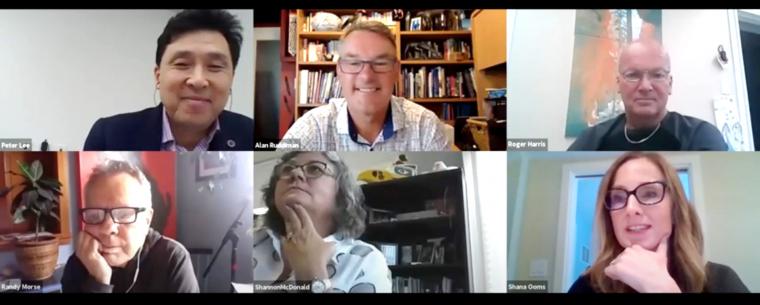- Managing your Practice
-
- Your Benefits
-

Introducing the ultimate Club MD experience
From work to play, and everything in between, we provide you with access to hundreds of deals from recognizable, best-in-class brands, elevating every facet of your life – from practice supports to entertainment, restaurants, electronics, travel, health and wellness, and more. Your Club MD membership ensures that these deals are exclusive to you, eliminating the need to search or negotiate.
Welcome to the ultimate Club MD experience. Your membership, your choices, your journey.
-
- Advocacy & Policy
-
- Collaboration
- News & Events
-

Stay Informed
Stay up to date with important information that impacts the profession and your practice. Doctors of BC provides a range of newsletters that target areas of interest to you.
Subscribe to the President's Letter
Subscribe to Newsletters
-
- About Us
-
Bringing community voices together at BC Rural & First Nations Summit
August 14, 2020
News
“Going forward, what changes have been adopted as part of the COVID-19 response that we should stop, sustain or scale?”
This question provided the foundation for a two-day virtual BC Rural and First Nations Health and Wellness Summit June 29-30, 2020, hosted by RCCbc, in partnership with the First Nations Health Authority (FNHA), and the Joint Collaborative Committees (JCCs).
The Summit aimed to build on outcomes from a BC Provincial Health Care Partners’ Retreat last year, and to capitalize on successes resulting from new and innovative solutions to deliver care during the COVID-19 crisis. The rapid and creative response of the health care community and partners to meet this need, and to expedite solutions, especially in the realm of virtual care, have presented new possibilities for the future.

Describe, dream design, deliver
With these goals in mind, more than 950 participants signed up for the opportunity to join virtual ‘appreciative inquiry’ discussions with peers and other stakeholders. Described as a ‘Partnership Pentagram Plus,’ health professionals and administrators; policy makers; academic institutions; community partners and citizens, as well as organizations with a vested interest in health (“linked sectors”) were invited to actively participate in the Summit.
The design of the gathering featured alternating rounds of dialogue, with groups meeting in virtual rooms. A total of 250 zoom meetings took place over the two days: 57 community partnership tables, and 26 peer groups, with over 100 facilitators, represented 42 distinct regions around the province. Discussions centred on gaps in rural and Indigenous health in six priority areas: 1) Virtually Enhanced Care 2) Transportation, 3) Team Based Care 4) Cultural Safety and Humility 5) Addictions and Overdose, and 5) Covid-19 Gaps and Advances.
Reflections & summaries
Three panel conversations helped to introduce and summarize proceedings. An opening panel centred around education, asking “What is the role of academia in ensuring that healthcare in BC is equitable, inclusive and diverse?” UBC President, Santa Ono committed to looking at how to integrate UBC teaching and learning with a lens of health and wellness.
The reflective panel on day two identified themes on how to identify and address inequities; how to break down silos in team-based care; the power of building relationships to tackle problems together; the importance of having safe places for difficult conversations; translating conversation into action; and looking to those receiving care for the definition of cultural safety. A participant likened the Summit to a ‘virtual village.’
Commitments & next steps
After the summit, members of the closing panel summarized key takeaways and commitments moving forward, including the value of community input and looking at community governance structures to support grassroots solutions; working towards a common understanding around language ie., “what does patient-centred care mean for all of us”?, so we are all clear on our goals; and addressing racism to enable culturally safe, equitable care.
The summit culminated in collective and individual commitments around the initial priority topics, with four specific areas seeing real traction for next steps:
- a Transport Partnership Table (led by PHSA)
- Virtual care innovation and alignment with primary care transformation (led by MoH)
- Supporting Ministry of Health leadership in improving cultural safety and eliminating systemic racism in healthcare (led by RCCbc)
- Advancing personal health record access for patients (led by JSC).
Broadening perspectives & opening minds
A full report provides details of outcomes from the summit, and feedback from participants, but in summary, feedback was very positive, with participants managing the virtual aspect well, and enjoying the chance to hear different perspectives and broaden their understanding of challenges needing to be addressed. The value of hearing those perspectives was not lost on Dr Ray Markham, Executive Director – Medicine of RCCbc, as he describes the mindshift he experienced as he listened to community conversations around rural transportation:
“There are really tangible pieces where I thought of things in one way entering into the conversation, and left the discussion thinking in an entirely different way. For example, I had a very provider-centric view on rural transport that focuses on moving people from my emergency room to an appropriate centre when they’re really sick. My eyes have been opened to the important aspects of transport and social determinants of health, and supporting a community voice in those conversations. That’s something that’s actively shifted in me as a result of the Summit.”




